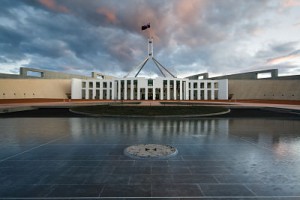
The chances of a breakthrough in the bitter two-year-long industrial relations battle between unionised Commonwealth public servants and the federal government are rapidly fading after Prime Minister Malcolm Turnbull revealed a double dissolution federal election could be called as soon as July 2.
The bombshell announcement on Monday morning all but eclipsed the biggest round of industrial action yet taken by the Community and Public Sector Union (CPSU) this week, including a whole of public service 24 hour strike followed targeted stoppages by Department of Immigration and Border Protection officers at airports over Easter.
Mr Turnbull on Monday conspicuously blanked the issue of the public service strikes, which have hit parts of the Department of Prime Minister and Cabinet, including a pointed question as to whether he had “failed to negotiate” an outcome.
“Well, look, I’m not directly involved in any negotiations there, so I can’t really comment on that,” Mr Turnbull said.
On the eve of the latest insdustrial action, the CPSU had appealed directly to Mr Turnbull to intervene in the dispute.
The Minister who is directly involved in navigating through the industrial row is Employment Minister Senator Michaelia Cash, who has been conspicuously charged with running the government’s attempt to force through legislation to resurrect the Australian Building and Construction Commission (ABCC) – the very trigger point Mr Turnbull is using to try and force a double dissolution election.
While the Turnbull government and the Australian Public Service Commission have provided some extra latitude for departmental chiefs to negotiate pay and condition outcomes, the biggest federal agencies – Human Services, Defence, Tax and Immigration and Border Protection – are still firmly holding out.
The core of the stalemate is an attempted movement of APS workplace conditions and entitlements out of agency Enterprise Agreements and into departmental policy, a shift that would allow departments to junk perks without recourse to industrial courts.
With an early election now just around the corner, it is understood that many senior public servants expect negotiations to be parked until after a July 2 poll, a scenario that could ultimately give public servants still holding out a much better deal than the present remnants of the hardline approach taken by former Employment and Public Service Minister Senator Eric Abetz.
In the event Mr Turnbull wins a July poll, a growing number of public servants expect a negotiation ‘reset’ over productivity and pay, with APS agency chiefs able to argue for incremental increases based on a proportion of savings made from technology enabled productivity enhancements.
One senior public servant told Government News there are still instances of public servants being required to manually retype files and records from one legacy system into another in order to keep things going, a fix that was neither quick nor economical.
Other APS efficiencies in the frame are considerable savings from Human Resources, Payroll and Enterprise Resource Planning systems that, if properly coordinated and standardised, could automate many back office functions, allowing agencies to focus more on policy and service deliverables.
In the event that approach eventuates, it could present a new and serious to the CPSU which could be forced to defend the jobs of members who would otherwise lose their positions thanks to automation.
In the interim, the strikes and phoney election campaign continue.





Leave a Reply